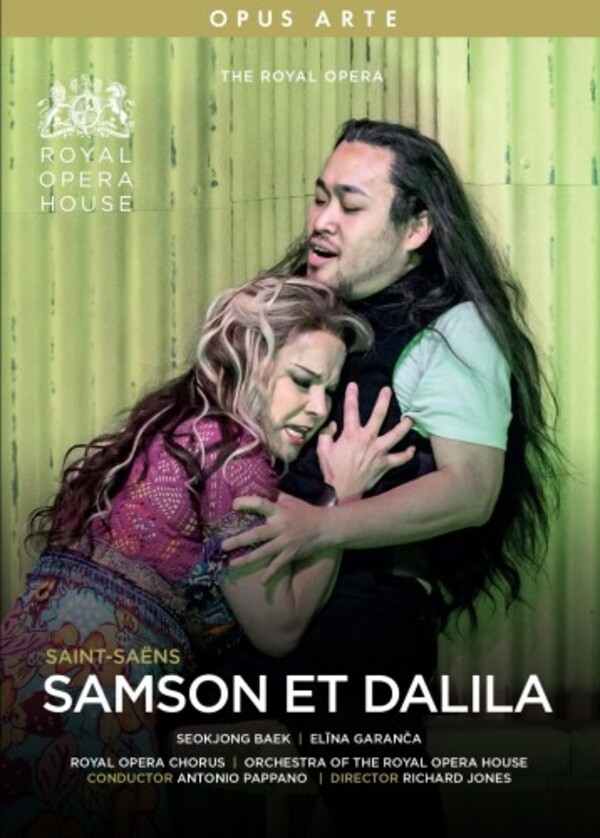SAINT-SAËNS Samson et Delila (Pappano)
View record and artist detailsRecord and Artist Details
Genre:
Opera
Label: Opus Arte
Magazine Review Date: 04/2024
Media Format: Digital Versatile Disc
Media Runtime: 133
Mastering:
DDD
Catalogue Number: OA1371D

Tracks:
| Composition | Artist Credit |
|---|---|
| Samson et Dalila |
Camille Saint-Saëns, Composer
Alan Pingarrón, First Philistine, Tenor Antonio Pappano, Conductor Blaise Malaba, Abimelech, Bass Chuma Sijeqa, Second Philistine, Baritone Elina Garanca, Dalila, Mezzo soprano Goderdzi Janelidze, Old Hebrew, Bass Lukasz Golinski, High Priest of Dagon, Bass-baritone Royal Opera House Chorus, Covent Garden Royal Opera House Orchestra, Covent Garden SeokJong Baek, Samson, Tenor Thando Mjandana, Messenger, Tenor |
Author: Tim Ashley
Richard Jones’s production of Samson et Dalila polarised opinion when it opened at Covent Garden in 2022. I didn’t see it in the theatre, but can’t say that I entirely warmed to it on DVD. It has unquestionable strengths: musically it is extremely fine; and it’s strikingly filmed by Peter Jones with an almost rhythmic combination of close-ups and wide shots that replicates the opera’s oscillation between intimacy and monumentality. But some of it lacks clarity and focus, and on occasion takes unnecessary liberties with both narrative and dramaturgy.
Jones apparently sought to avoid orientalism (difficult to do with this work) and, though presenting the opera in 20th-century dress, refused, wisely, to anchor it to any specific religious or political conflict. So what we have is a clash between an austere, closely knit Jewish community and a nebulously observed totalitarianism that combines brutality with profligate hedonism. The Philistine High Priest has become a military type in a fur-lined parka, lording it over a gang of thuggish squaddies, whom we first encounter abusing women in the street. Later they reveal a penchant for line dancing during the kitsch Bacchanale in Dagon’s temple, where the god’s statue is a red-nosed clown clutching a slot machine in one hand and a bag of gambling chips in the other. The tackiness is inescapable.
Abimélech, meanwhile, has become Dalila’s kinsman, and it is his murder by Samson that now provokes her decision to destroy the Israelite hero, all of which is at odds with both libretto and score. Some of Jones’s interventions just about work: the Philistines’ murder of the Old Hebrew precisely at the moment Samson reveals the secret of his strength to Dalila is genuinely chilling. Others, however, misfire: ‘Voici le printemps’ is sung not by Philistine women as a prelude to seduction but by the Israelites in formal celebration of Samson’s victory, which undermines its eroticism. The ending is anticlimactic to the point of bathos.
The performance is terrific, however. Antonio Pappano conducts with relentless energy, forging a consistent stylistic and dramatic unity from the eclectic mix of elements – Bach’s Passions, Wagnerian chromaticism, North African music – that fired Saint-Saëns’s imagination. The playing is superb in its detail and intensity, from the grinding pedal points that underscore the Israelites’ spiritual certainties to the brittle allure of the Philistines’ glitz and razzle, and the chorus are are on similarly splendid form, whether expressing spiritual fervour, savage mockery or hedonistic glee.
Nicky Spence had originally been cast as Samson, though injury forced his withdrawal, leading to his replacement by Korean tenor SeokJong Baek, who was singing Samson for the first time. He began his career as a baritone, and a warm fullness of tone remains in his lower registers, though his top is easy and free, nobly expressive and beautifully controlled. His soft singing captures a vulnerability that eludes some Samsons and there are some breathtaking high pianissimos in his long duet with Elīna Garanča’s Dalila. She is simply magnificent throughout, her tone dark and velvety, those low notes all sumptuously in place, her upper registers gleaming. A subtle, compelling actress, she more than transcends Jones’s theatrical waywardness as well.
There are strong performances elsewhere. Łukasz Goliński makes a fierce High Priest, bristling with supercilious arrogance and contempt. Blaise Malaba’s smug Abimélech occasionally lacks focus, though Goderdzi Janelidze is splendidly fervent and sonorous as the Old Hebrew. In so many ways, this demands to be heard, though you may not like the staging. An audio-only release on CD would perhaps have been better.
Discover the world's largest classical music catalogue with Presto Music.

Gramophone Digital Club
- Digital Edition
- Digital Archive
- Reviews Database
- Full website access
From £8.75 / month
Subscribe
Gramophone Full Club
- Print Edition
- Digital Edition
- Digital Archive
- Reviews Database
- Full website access
From £11.00 / month
Subscribe
If you are a library, university or other organisation that would be interested in an institutional subscription to Gramophone please click here for further information.




